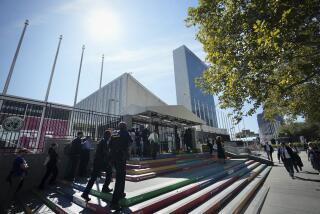REPORTER’S NOTEBOOK : Hats Off for U.N. Chief in Sarajevo
- Share via
SARAJEVO, Bosnia-Herzegovina — Boutros Boutros-Ghali, the secretary general of the United Nations, is a slight, professorial man who peers out at the world through oversized, owlish glasses.
Since Sarajevo is a war zone, the commanders of the U.N. peacekeeping forces there insist that civilian visitors wear a blue helmet and a flak jacket. That rule applied to the boss as well when he arrived on the eve of the new year.
With the protective jacket under his suit, an enormous parka on top of that, and a helmet reaching down almost to the frame of his glasses, Boutros-Ghali looked a little like Michael S. Dukakis in his unfortunate tank ride during the 1988 presidential campaign.
When Bosnian Vice President Ejud Ganic escorted him out of the government house, Boutros-Ghali dutifully donned his helmet.
Ganic, wearing only a suit, said, “Of course, we Bosnians do not wear those things.”
Boutros-Ghali whipped the helmet right off.
“In that case, I won’t, either,” he said.
Alarmed that he’d gone too far with his bravado, Ganic protested “No, no, no.”
After a few moments of entreaty, the secretary general relented. The helmet went back on.
*
A visitor approaching Sarajevo airport learns swiftly that landings and takeoffs here are not normal. The Ukrainian pilots of the secretary general’s U.N. plane, a Soviet-made Antonov transport, flew high over Sarajevo and then dived suddenly to the landing. Later, with enormous power, they took off in a lurch, climbing at an incredibly open angle, as if trying to reach the skies in a perpendicular path.
A Belgian transport officer explained the problem. The plane was trying to avoid small arms fire from the ground. The dive on landing and the powerful takeoff are normal, he says.
*
The swift visit afforded an odd but dispiriting view of Sarajevo. Visitors were piled into French armored cars. members of the French Foreign Legion covered and latched down the windows for safety. But the gun turrets remained open and a visitor below could look upward past the Legionnaire standing there for a strange, worm’s-eye view.
The street level wasn’t visible. The view afforded as the armored cars hurtled through the streets began at the first floor but that was bad enough. Flashing by were the burned-out shells of building towers, shell-pocked facades, crushed chunks of 19th-Century architecture, the twisted rubble of roofs and window glass shattered in a thousand different patterns.
*
Sarajevo looked so much like the movie set of a war-devastated city that it was almost a surprise to see people, huddled in winter clothes, appear on the streets to wave their fists and cry out threats and curses at Boutros-Ghali. Some cynics in the secretary general’s entourage called them “rent-a-crowds”--people hired for the occasion, like actors. But they seemed real and menacing enough. There is no doubt that Sarajevo’s remaining residents feel a great deal of fury, much of it directed at the ineffectiveness of the United Nations.
“Somehow life is going on,” Ganic told Boutros-Ghali, “but (it’s) slowly dying.”
*
Jean Claude Aime, the secretary general’s chief of staff, was upset. Boutros-Ghali was sitting in an elegant conference room in the government house listening to some acid criticism of the United Nations from Ganic.
Aime grabbed Mick Magnusson, the U.N. information officer, saying: “I want the press out.”
“I’m sorry,” Magnusson replied. “Bosnians make the rules here. And they have let the press in.”
A U.N. military officer then interrupted the public dialogue between Boutros-Ghali and Ganic to see if they would like the press to leave. Before the secretary general could say anything, Ganic proclaimed: “We have no objection to the press hearing whatever we have to say.”
The media remained.
More to Read
Sign up for Essential California
The most important California stories and recommendations in your inbox every morning.
You may occasionally receive promotional content from the Los Angeles Times.










